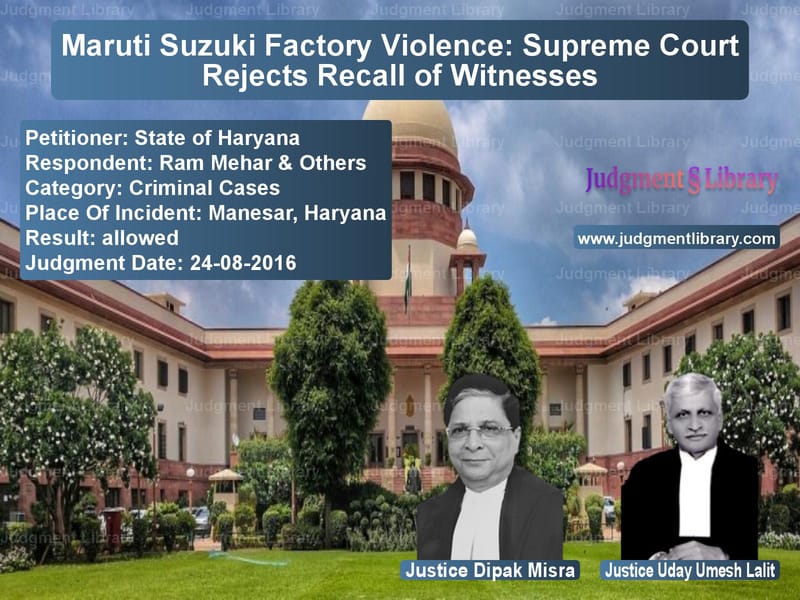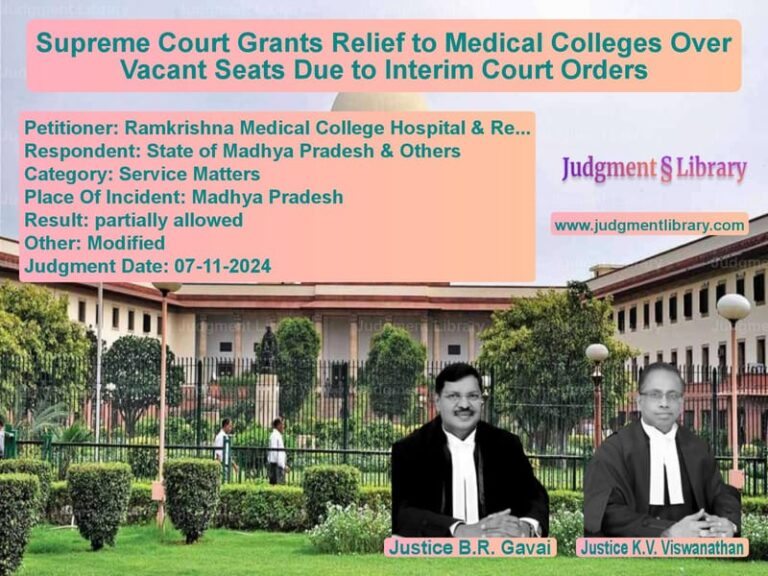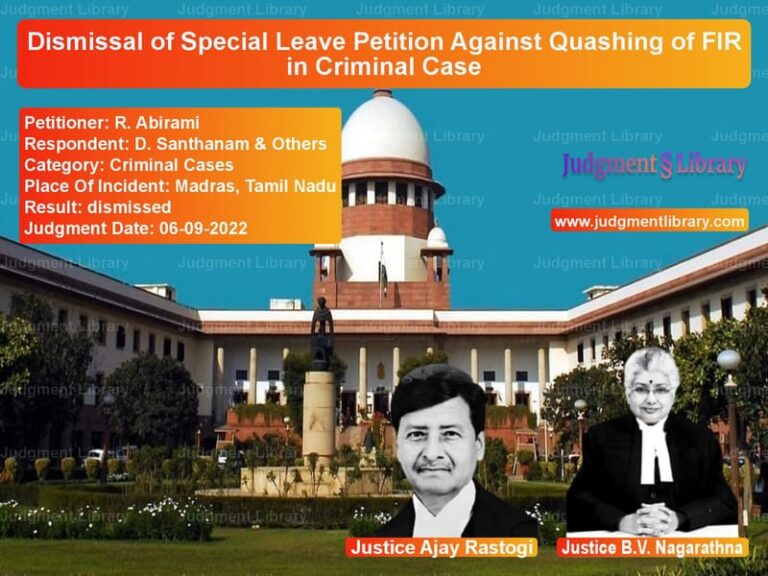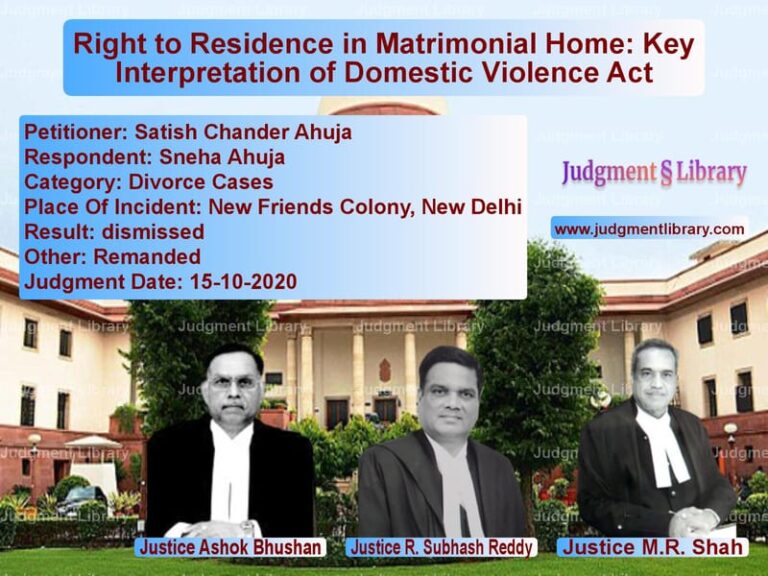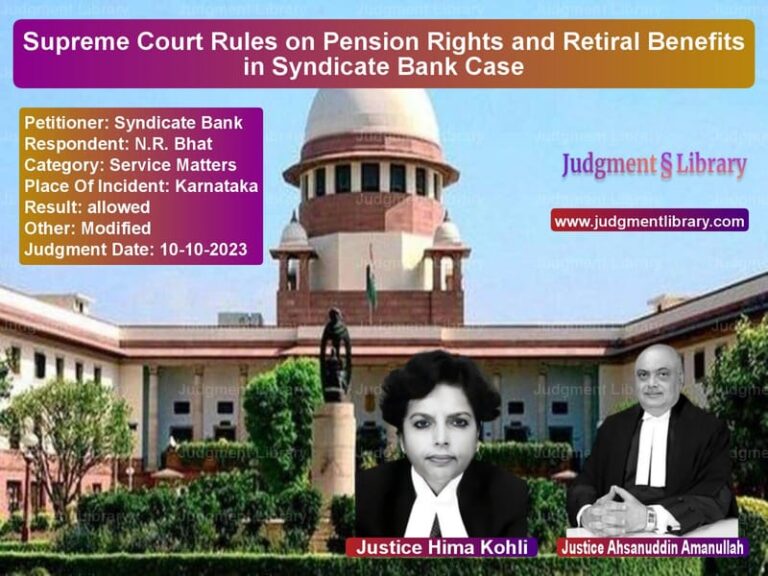Maruti Suzuki Factory Violence: Supreme Court Rejects Recall of Witnesses
The Supreme Court of India, in the case of State of Haryana vs. Ram Mehar & Others, ruled on a significant criminal appeal concerning the infamous Maruti Suzuki factory violence incident in Manesar, Haryana. The case involved serious charges, including murder, arson, and rioting, against 148 workers following the violent events of July 18, 2012. The Supreme Court set aside the High Court’s decision that allowed the recall of witnesses, thereby reaffirming the importance of preventing delays in criminal trials.
Background of the Case
On July 18, 2012, at around 7 PM, a violent altercation erupted at Maruti Suzuki’s Manesar factory. According to the prosecution:
- A group of armed workers stormed the M1 room of the factory, wielding door beams and shockers.
- They smashed the glass walls of the conference room, threw chairs, and blocked staircases to prevent the management officials from escaping.
- The factory premises were set on fire, resulting in the death of Avnish Dev, General Manager, Human Resources, who was burned alive.
- Police officers attempting to control the situation were assaulted by the mob.
The Haryana police subsequently filed an FIR (No. 184/2012) at the Manesar Police Station. A charge sheet was submitted against 148 workers under various sections of the Indian Penal Code (IPC), including Sections 302 (murder), 307 (attempt to murder), 436 (mischief by fire), 147/148 (rioting), and 120B (criminal conspiracy).
Arguments of the Petitioners (State of Haryana)
The prosecution argued:
- The recall of prosecution witnesses would delay the trial, which had already been ongoing since 2013.
- Allowing the recall would amount to an abuse of the judicial process.
- Witnesses had already been cross-examined at length, and any attempt to recall them was merely a strategy to weaken their testimonies.
- The trial was being conducted fairly, and the accused had been given multiple opportunities to present their defense.
Arguments of the Respondents (Accused Workers)
The defense contended:
- Many crucial questions were inadvertently omitted during the initial cross-examination due to their lawyer’s illness.
- Witnesses needed to be recalled to establish discrepancies in the prosecution’s case.
- They had not been given a fair opportunity to put forth their version of events.
- Since the accused were in custody for over four years, a fair trial required that they be allowed to recall key witnesses.
Supreme Court’s Judgment
The Supreme Court, in a judgment authored by Justices Dipak Misra and Uday Umesh Lalit, ruled against the recall of witnesses. The key findings were:
- The right to recall witnesses under Section 311 of the Code of Criminal Procedure (CrPC) must be exercised judicially and not as a delaying tactic.
- The accused had already cross-examined witnesses, and permitting further questioning would compromise judicial efficiency.
- The High Court had erred in allowing the recall of witnesses based on the argument of a defense lawyer’s illness.
- Fair trial principles apply to both the accused and the victims, and indefinite delays in trials weaken the justice system.
Judicial Observations
The Supreme Court made several crucial observations regarding the right to a fair trial and the misuse of procedural provisions:
1. Right to Fair Trial Must Be Balanced:
“A fair trial does not mean an endless trial. The concept of justice applies equally to the victim, the accused, and the society at large. The process of law cannot be misused under the guise of ensuring fairness.”
2. No Justification for Recall Based on Defense Strategy:
“If recalling witnesses becomes an automatic right, trials would never reach finality. The defense had ample opportunity to cross-examine the witnesses at the appropriate stage, and failing to do so cannot be a ground for recall.”
3. Speedy Trial is Essential:
“Delaying trials affects both the prosecution and the victims. It is essential that criminal cases, particularly those involving serious offenses, proceed without unnecessary hindrances.”
Impact of the Judgment
1. Preventing Delays in Criminal Trials
The ruling reinforces the need to prevent undue delays in the criminal justice system, ensuring that trials are not derailed by procedural tactics.
2. Balancing Rights of Accused and Victims
The judgment highlights the importance of considering the victims’ rights in criminal proceedings and not allowing procedural loopholes to favor the accused.
3. Strengthening Judicial Efficiency
The Court reaffirmed that allowing repeated recalls of witnesses undermines the credibility of judicial proceedings and burdens the system unnecessarily.
Conclusion
The Supreme Court’s ruling in State of Haryana vs. Ram Mehar & Others sets an important precedent in criminal law by emphasizing the importance of timely trials. By rejecting the recall of witnesses, the Court reaffirmed the principle that procedural fairness cannot be allowed to delay justice indefinitely. The decision serves as a reminder that the right to a fair trial must be balanced against the need for judicial efficiency and the interests of victims and society.
Don’t miss out on the full details! Download the complete judgment in PDF format below and gain valuable insights instantly!
Download Judgment: State of Haryana vs Ram Mehar & Others Supreme Court of India Judgment Dated 24-08-2016-1741878538555.pdf
Direct Downlaod Judgment: Direct downlaod this Judgment
See all petitions in Murder Cases
See all petitions in Attempt to Murder Cases
See all petitions in Custodial Deaths and Police Misconduct
See all petitions in Judgment by Dipak Misra
See all petitions in Judgment by Uday Umesh Lalit
See all petitions in allowed
See all petitions in supreme court of India judgments August 2016
See all petitions in 2016 judgments
See all posts in Criminal Cases Category
See all allowed petitions in Criminal Cases Category
See all Dismissed petitions in Criminal Cases Category
See all partially allowed petitions in Criminal Cases Category

